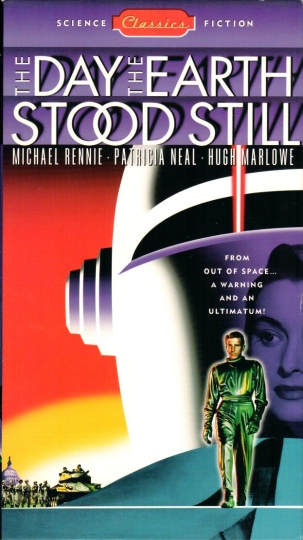

| Major Cast | |
|---|---|
| Michael Rennie | as Klaatu |
| Patricia Neal | as Helen Benson |
| Hugh Marlowe | as Tom Stephens |
| Sam Jaffe | as Professor Jacob Barnhardt |
| Billy Gray | as Bobby Benson |
| Frances Bavier | as Mrs. Barley |
| Lock Martin | as Gort |
| MPAA Rating: | Approved |
| Production Company: | Twentieth Century Fox Film Corporation |
| Distributors (USA): | * Twentieth Century Fox Film Corporation * National Broadcasting Company (TV) * Magnetic Video (VHS) * CBS/Fox (video/laserdisc) * Twentieth Century Fox Film Corporation (1994 theatrical reissue) * Fox Video (video/laserdisc) * 20th Century Fox Home Entertainment (DVD) |
| Languages: | English | French | Hindi | Russian |
| Release Date (US): | 9/18/1951 |
| Running Time: | 92 minutes |
| Domestic Box Office: | $1,850,000 (Rentals) |
| Foreign Box Office: | $? |
| Production Budget: | $1,200,000 (Est.) |
An interplanetary spaceship approaches from parts unknown and lands on the Mall at Washington, DC. It is quickly surrounded by heavily armed troops. After two hours or so, a ramp extends from the ship and a humanoid figure clad in a space suit walks down it. The figure holds up a device and is immediately shot by a trigger-happy soldier. He falls, wounded in the arm. A massive robot emerges from the ship. With a ray it destroys the massed weapons. But the figure commands it to stop. The wounded man is rushed to Walter Reed hospital.
After he recovers, a government official vists. Klaatu requests a meeting with all the world's leaders. The official, Haley, tells him this will probably be impossible. Klaatu insists, and Haley promises to recommend such a meeting to the president. Soon he returns and presents a batch of telegrams that all set forth mutually incompatible conditions.
Klaatu escapes from the hospital. Dressed as a businessman and using the name Carpenter, he takes a room at the boarding house where Helen Benson, a war widow, lives with her son Bobby. He offers to look after Bobby when Helen is busy. Helen is glad to have Mr. Carpenter's help that weekend as she is being courted by Tom Stephens. Carpenter and Bobby explore Washington and ultimately visit the home of Professor Barnhardt, whom Bobby describes as the smartest man on Earth. Klaatu hopes the professor's influence can break the logjam. Finding him away, Klaatu leaves a calling card in the form of corrections to some equations on a blackboard. It works; Klaatu is summoned by Professor Barnhardt.
Klaatu opens up to the professor, who suggests a demonstration of some sort, dramatic but not destructive, would help get things moving. Klaatu leaves to arrange this. But to do so he must get to his spaceship. He goes that night, on foot, and Bobby follows him. Bobby watches Klaatu enter the ship, then runs home. He tells Helen in Tom's presence what he saw, but she doesn't believe him. However, Tom finds one of the diamonds Klaatu uses for currency. When he has it checked out the next day, he is convinced. He sees a way to become a big man, and lets the Army know where the spaceman is.
Meanwhile, Klaatu visits Helen at work so he can find out what Bobby told her. They enter an elevator just as the demonstration begins: all electricity is neutralized at the source, throughout the world — except where its loss would harm life: airplanes in flight, hospitals, etc. Klaatu enlists Helen's help. By that evening, Tom has the Army's trust and the chase is on. Helen and Klaatu escape the boarding house in a taxi, but are soon surrounded. Klaatu gives Helen a message to take to Gort if something happens to him.1 Soon their taxi is boxed in. Klaatu flees on foot and is shot and killed. Will Helen be able to get the message he gave her to Gort, the robot, and can Gort save the day?
At the very beginning of the film, we see some radar technicians first detect Klaatu's spaceship on final approach. None of them are in uniform; they wear white t-shirts and long pants. Casual Friday in the military? Unlikely.
Despite small goofs like that, the film is excellent in plotting and performances.2 Michael Rennie steals the show as Klaatu, but Patricia Neal makes the plot work with her nuanced performance as a war widow who puts aside her very human fears and insecurities in favor of the larger interests and enables Klaatu to deliver his message. It won the Golden Globe award in 1952 for the film best promoting international understanding, and has a place on the National Film Registry. It delivers a strong message, but in subtle ways. I should say messages. One, as Klaatu visits Arlington Cemetery and the Lincoln Memorial, is anti-war. Another is that greed should not overwhelm human relationships. The last is not to fear change — or, as Professor Barnhardt tells his housekeeper Mrs. Barley during the demonstration, to accept the discomfort it brings.
"Does all this frighten you, Hilda? Does it make you feel insecure?"
"Yes, sir, it certainly does!"
"That's good, Hilda. I'm glad."
My Rating:
9 out of 10
Capsule review: The special effects are just passible even by 1951 standards, but they get the job done. Performances are what make this a film to remember, and the cast all turn in solid performances, notably Michael Rennie and especially Patricia Neal. This is a classic masterpiece that belongs in every film fan's collection.
| IMDB Rating: 7.8 | Raters: 81,944 |

 To contact Chris Winter, send email to this address.
To contact Chris Winter, send email to this address.